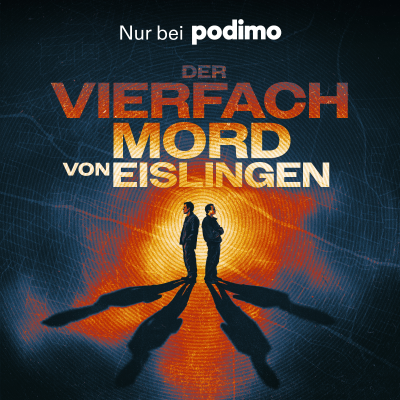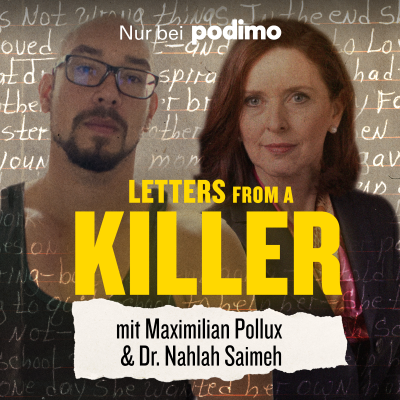
The Vet Vault: Fall In Love With Veterinary Science
Englisch
Kostenlos bei Podimo
Kostenlos hören bei Podimo
Starte jetzt und verbinde dich mit deinen Lieblingspodcaster*innen
- Vertraut von über 1 Mio. deutschen Hörer*innen
- Über 1.000 lokale Podcasts und Shows – nur bei Podimo
- Keine Zahlung nötig
Mehr The Vet Vault: Fall In Love With Veterinary Science
Vet life can be tough—but it’s also good. So, how do we make it even better? Join inspiring conversations with veterinary trailblazers who share real stories, fresh ideas, and strategies to help the talented, passionate humans (like you!) who make up the veterinary profession thrive—in work and in life. Hosted by Dr. Hubert Hiemstra, a veterinarian with over 20 years of experience and a passion for helping vets build happier, more fulfilling careers. Hubert brings warmth, curiosity, and a knack for asking the right questions, creating a space where the best ideas in vet med come to life.
Alle Folgen
209 Folgen155: Antibiotic Prescribing Habits Vets Need To Ditch Now. With Dr Riati Scarborough and Dr Laura Hardefeldt
Four years after our original antibiotic myth-busting episode (Ep 60), we’re back with Dr Riati Scarborough [https://findanexpert.unimelb.edu.au/profile/852843-ri-scarborough] to talk antibiotic prescribing habits. This time we’re joined by fellow stewardship expert Dr Laura Hardefeldt [https://findanexpert.unimelb.edu.au/profile/773931-laura-hardefeldt], and this time we’re asking the harder question: Have we actually changed? The good news? Some prescribing habits are shifting. We’re seeing shorter courses and less ‘just in case antibiotic usage. But let’s not pat ourselves on the back too quickly. Because some of our most entrenched habits are still alive and well, like how we treat skin disease, and our ongoing love affair with amoxiclav. This episode is a practical, clinically grounded update on what the evidence says in 2026 - and how to make realistic changes without compromising patient care. We cover: * Why skin disease remains the single biggest driver of antimicrobial resistance in small animal practice, and what to do about it * Amoxicillin vs amoxiclav: when de-escalation is not just safe, but smarter * Why convenience (you know the brand we’re talking about right…) is not a clinical indication * Trimethoprim-sulphonamide and the real story on KCS risk * Dentals, heart murmurs, and what prophylaxis actually looks like in 2026 * Simple in-clinic stewardship strategies that genuinely shift prescribing behaviour This isn’t about perfection. It’s about progress. If you’d like effective antibiotics to still exist in five to ten years… This episode is essential listening. Find out how we can support you in your vet career at thevetvault.com [https://www.thevetvault.com]. Subscribe to our weekly newsletter here [https://thevetvault.substack.com/?r=2v2kg5&utm_campaign=pub-share-checklist]for Hubert's favourite clinical and non-clinical learnings from the week. Grab one last handful of spots in the Maldives for our surf/dive vet conference with Vets On Tour [https://vetsontour.com/]. Tips and Timestamps * 3:03 Progress in prescribing habits including UTI durations and surgical prophylaxis * 4:55 Skin disease as the biggest problem area in small animal practice * 7:01 Topical therapy versus systemic antibiotics for skin conditions * 9:28 Deep pyoderma and the new consensus statement * 11:00 Gut bacteria as a source of resistant infections * 12:41 Rise of MRSP, methicillin-resistant Staphylococcus pseudintermedius * 14:00 Amoxicillin-clavulanate overuse * 16:47 Vets on Tour conferences advertisement * 18:08 Pharmacology refresher on amoxicillin, amoxicillin-clavulanate, and cefovecin * 19:45 Why cefovecin is classified as high importance, vs the convenience argument for cefovecin in cats * 22:56 Long-acting amoxicillin injections as an alternative * 24:00 Getting amoxicillin back on the shelf * 24:53 Communicating antibiotic choices to clients * 29:32 Dental antibiotics and debunking the heart murmur myth * 34:07 Subclinical bacteriuria and stopping cultures in asymptomatic patients * 38:30 Reassessing the dry eye risk of trimethoprim-sulfonamide * 41:43 Antimicrobial stewardship trial using colour-coded pharmacy shelves
154: Stop the Energy Drain: Productivity Coaching for Vets in Clinic Chaos. With Demir Bentley and Dr Ray Gates
Veterinary life can feel like a treadmill with no off-switch: 15-minute consults that always run over. Emotional labour no one trains you for. A schedule that swings from slow to chaos - in minutes. Sound familiar? You’re not alone. In this raw and refreshingly real episode, productivity coach Demir Bentley (Life Hack Method) [https://lifehackmethod.com/about/] live-coaches GP vet Dr Ray Gates, tackling the uncomfortable truth of veterinary medicine:You’re expected to be clinically excellent… while running on empty. This isn’t a listicle of “10 productivity hacks.”This is about reclaiming 1% wins that actually work in the chaos of clinical life. You’ll learn: * Why productivity isn’t about doing more - it’s about protecting your energy * How “chaos as the default” leads to burnout (and how you can change the system, not just yourself) * How to lower your cognitive load and reduce admin fatigue * The art of setting goals that don’t become another source of stress * Small upstream shifts that stop downstream disasters * How to finish a shift and still feel like you Whether you’re buried in charting, stuck in overbooked consults, or silently wondering if you’re just not “resilient enough” - this conversation will show you another way. You don’t need another motivational quote.You need practical tools to get your time, headspace, and energy back. And it starts here. Raise your hand here [https://yespleasehugh.com] to find out more about our AI for clinics Mastermind Find out how we can help you build you in your vet career at thevetvault.com [https://www.thevetvault.com]. Subscribe to our weekly newsletter here [https://thevetvault.substack.com/?r=2v2kg5&utm_campaign=pub-share-checklist]for Hubert's favourite clinical and non-clinical learnings from the week. Topics and Time Stamps 10:56 The problem 23:04 The revenge binge 26:10 Taking back the 1% 35:52 Upstream changes to prevent downstream chaos 41:31 Expectations vs reality 52:05 You are not powerless
153: What’s Holding You Back? 3 Keys to Rewiring Your Brain for Calm, Confidence, and Clarity. With Dr Rod Irwin
Ever feel like your anxiety or fear of failure is just... who you are? The perfectionism. The overthinking. The constant pressure to “get it right.” It can feel like it’s wired into your DNA. But what if it isn’t? Dr Rod Irwin [https://getwiredforsuccess.com/free-consult/for-vets/], vet, former clinic owner and author tells us how who went from panic attacks in an empty vet clinic to a completely rewired life - thanks to neuroscience. After hitting breaking point, a chance encounter with neuroscience set him on a 15-year journey into neuroplasticity and positive psychology - and ultimately changed how he led. Together, we unpack how our brains are shaped by past experiences, why vets are particularly vulnerable to negative belief loops, and how we can deliberately rewire our thinking to reduce anxiety, improve performance and build healthier workplace cultures. We explore: * Why early experiences like bullying and perfectionism hardwire us for burnout * What neuroplasticity actually means, and why this isn't just “positive thinking” * How emotions strengthen or weaken your neural pathways * Dr Irwin’s first 3 practical steps to start rewiring your brain * Why your identity is the key to lasting change * How clinic leaders unconsciously set the emotional tone for the entire team * And how reconnecting to purpose and values can transform your culture This is a science-backed, practical conversation on mindset, leadership and wellbeing – tailored to the veterinary world. Because your brain isn’t broken.It’s just wired by experience - and you can change the wiring. [https://cve.edu.au/Web/Continuing_Education/Registration/Event_Display.aspx?EventKey=CSDESURG26] Learn about all 12 keys here [https://getwiredforsuccess.com/], or here [https://rodirwin.com/] if you're a practice owner, or book a chat with Rod here [https://getwiredforsuccess.com/free-consult/for-vets/]. Find out how we can support you in your vet career at thevetvault.com [https://www.thevetvault.com]. Subscribe to our weekly newsletter here [https://thevetvault.substack.com/?r=2v2kg5&utm_campaign=pub-share-checklist]for Hubert's favourite clinical and non-clinical learnings from the week. Grab one last handful of spots in the Maldives for our surf/dive vet conference with Vets On Tour [https://vetsontour.com/]. Get case support from our team of specialists in our Specialist Support Space [https://the-vet-vault.mn.co/share/pWYTrfLxiUnCVDHu?utm_source=manual%E2%81%A0]. Check out our Advanced Surgery Podcast at cutabove.supercast.com [http://cutabove.supercast.com/], or go all in on surgery with our collaboration with Sydney University's CVE Surgery Course. [https://cve.edu.au/Web/Continuing_Education/Registration/Event_Display.aspx?EventKey=CSDESURG26]
152: Tech Tools 1: VetRec. With Kevin Cohen
Welcome to episode one of our new Tech Tools series, where we cut through the noise to bring you real insights into the latest veterinary tech that could genuinely make your day‑to‑day vet life easier. In part one VetRec [https://www.vetrec.io/?r=0] founder Kevin Cohen [https://www.linkedin.com/in/pkevincohen/] helps me put this AI scribe through its paces to show us why veterinary AI software is rapidly moving WAY beyond just note taking. Highlights : * What an AI scribe really is and how it saves vets hours of documentation time * Beyond scribing - new tools to speed up your workflow with increased reliability and context * VetRec’s clinical support tool: D.A.V.I.D. (Diagnostics Assistance for Veterinary Insights and Differentials) * Team workflows — how receptionists, nurses and vets can collaborate in the same platform This one involves a bit of screen sharing, so if you want to follow along - watch the video for this on Spotify. Note: This episode isn’t a promotion or an ad — it’s the first of many deep dives into the tools you might be considering. If you have a software that you’d like us to explore, let me know at info@thevetvault.com Check out our Advanced Surgery Podcast at cutabove.supercast.com [http://cutabove.supercast.com/], or go all in on surgery with our collaboration with Sydney University's CVE Surgery Course. [https://cve.edu.au/Web/Continuing_Education/Registration/Event_Display.aspx?EventKey=CSDESURG26] Find out how we can help you build you in your vet career at thevetvault.com [https://www.thevetvault.com]. Get case support from our team of specialists in our Specialist Support Space [https://the-vet-vault.mn.co/share/pWYTrfLxiUnCVDHu?utm_source=manual%E2%81%A0]. Subscribe to our weekly newsletter here [https://thevetvault.substack.com/?r=2v2kg5&utm_campaign=pub-share-checklist]for Hubert's favourite clinical and non-clinical learnings from the week. Join us in person for our epic adventure CE events at Vets On Tour [https://vetsontour.com/]. (Next up: Japan snow conference!) Topics and Time stamps * 04:05 – New Features 2025 * 05:19 – Add to Visit * 07:46 – DictationFeatures * 08:35 – A Cut Above Promo * 10:08 – Snippets * 12:15 – Insights & Recommendations * 13:59 – Integrations * 16:06 – EzyVet Chrome Extension * 17:05 – Custom Templates * 17:58 – Phone Call Recording * 21:38 – Multi-Pet Support * 22:33 – Client Handouts * 24:07 – Analysis Features * 28:38 – David AI Assistant * 38:03 – Records Recap * 41:09 – Team Access * 42:29 – Best Recording Practices
151: Why Do I Still Feel Like Such an Imposter? (This Is What Getting Better Feels Like). With Dr Marie Holowaychuck, Dr Kerri Nelson and Dr Rob Webster
Am I a useless vet? Sounds like a silly question that a new grad might ask, right? But imposter syndrome doesn't care about your credentials. It whispers that you're a fraud, that you got lucky, that one day everyone will realise you don’t belong. Or maybe you don’t feel like an imposter - but you beat yourself up after a case goes wrong. You replay every missed diagnosis. You hold yourself to an impossible standard, and when you fall short (even slightly), the inner critic shows no mercy. Sound familiar? In veterinary medicine, where perfection often feels like the baseline and the emotional toll runs deep, these patterns can be exhausting. But here’s the truth: you’re not the only one who feels this way. In this raw and honest conversation, we unpack: * Why imposter syndrome isn’t just a new grad thing - it can resurface anytime you step into something new, no matter how experienced or accomplished you are (Just keep listening if you don’t believe me) * What confidence really looks like - not knowing everything, but being willing to try, learn, and grow * Why perfectionism is often at the root of imposter - and what to do about it * Making peace with the inner-critic * Why vulnerability matters * A simple mindset shift that can make all the difference * And practical strategies to manage imposter feelings You’ll hear real stories, mindset tools, and the reminder that feeling “useless” says nothing about you. If you’ve ever questioned your abilities or felt like you're just pretending to hold it all together - this episode is your mirror. You belong here. And it’s time you believed that too. Our guests are: Dr Marie Holowaychuck [https://marieholowaychuk.com]- a board-certified emergency and critical care veterinarian and the founder of Reviving Vet Med, a global initiative dedicated to equipping veterinary professionals with practical tools for mental health, resilience, and work–life balance, and the author of A Compassionate Calling: What It Really Means to be a Veterinarian. Check out her new book here. [https://marieholowaychuk.com/book/] Dr Kerri Nelson [https://substack.com/@drkerrinelson?utm_source=global-search]: Experienced ER vet, mentor and former medical director. First time mom-to-be! (She has an epic blog about over-achieving - here [https://substack.com/@drkerrinelson?utm_source=global-search].) Dr Rob Webster [https://animalemergencyaustralia.com.au/about-us/our-company/]: Co-Chief Executive Officer of Animal Emergency Australia, the leading veterinary emergency-care group down under, where he oversees clinical standards and consults on complex emergency and critical-care cases. A board-certified specialist in emergency and critical care since 2014. Jiu-jitsu tragic. Check out our Advanced Surgery Podcast at cutabove.supercast.com [http://cutabove.supercast.com/], or go all in on surgery with our collaboration with Sydney University's CVE Surgery Course. [https://cve.edu.au/Web/Continuing_Education/Registration/Event_Display.aspx?EventKey=CSDESURG26] Find out how we can help you build you in your vet career at thevetvault.com [https://www.thevetvault.com]. Get case support from our team of specialists in our Specialist Support Space [https://the-vet-vault.mn.co/share/pWYTrfLxiUnCVDHu?utm_source=manual%E2%81%A0]. Subscribe to our weekly newsletter here [https://thevetvault.substack.com/?r=2v2kg5&utm_campaign=pub-share-checklist]for Hubert's favourite clinical and non-clinical learnings from the week. Join us in person for our epic adventure CE events at Vets On Tour [https://vetsontour.com/]. (Next up: Japan snow conference!) Topics and Time stamps 04:28 You're not alone 09:56 What is a syndrome? 15:49 Defining Imposter Syndrome 19:44 Maybe It's Just Kinda Normal? 22:10 So What Can We Do About It? 27:22 The Eternal Internal Critic 30:22 Talk It Out 35:59 Vulnerability As A Weapon Against Imposter 39:03 This Is What Getting Better Feels Like 40:18 Perfectionism - The Root of Imposter 49:28 At Least You'er Not a Psychopath! 51:04 The Best People Are Filled With Self-Doubt 51:56 Mistakes Happen















































